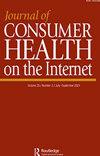Religious Sources of COVID-19 Vaccine Information, Authentication and Vaccination Acceptance Among Students in Selected Universities in Nigeria
IF 0.7
Q4 PUBLIC, ENVIRONMENTAL & OCCUPATIONAL HEALTH
引用次数: 1
Abstract
Abstract This study sought to examine the relationship between religious sources of COVID-19 Vaccine information, Authentication and Vaccination acceptance among students in selected universities in Nigeria. A simple random technique was adopted for sampling. An anonymous survey was conducted online among Nigeria students in selected universities. Data were analyzed using descriptive and inferential statistics. Of the 521 participants surveyed, 74(14.2) stated that they have already received COVID-19 vaccination, while 286 (54.9%) intend to be vaccinated as soon as the vaccine becomes available. Sourcing COVID-19 Vaccine information on Facebook has a significant positive relationship with the intent to vaccinate (r = 0.146**, N = 521, p < 0.05), while online newspapers was found to have a significant positive relationship with the intent to vaccinate (r = 0.123**, N = 521, p < 0.05). Authenticating received information has a significant positive relationship with the intent to vaccinate (r = 0.159**, N = 521, p < 0.05). The study concluded that religious sources of COVID-19 vaccine information and information authentication are essential for vaccine acceptance. Therefore, it recommends that the vaccine acceptability may be increased if students use Facebook and online newspapers more for their religious sources of COVID-19 Vaccine information. However, authenticating this information will have more impact on vaccine acceptability.尼日利亚部分大学学生COVID-19疫苗信息的宗教来源、认证和疫苗接种接受情况
摘要本研究旨在研究尼日利亚选定大学学生中COVID-19疫苗信息的宗教来源、认证和疫苗接种接受程度之间的关系。采用简单的随机抽样方法。一项匿名在线调查在尼日利亚选定大学的学生中进行。数据分析采用描述性和推断性统计。在接受调查的521名参与者中,74人(14.2%)表示他们已经接种了COVID-19疫苗,而286人(54.9%)打算在疫苗可用后立即接种疫苗。在Facebook上获取COVID-19疫苗信息与接种意愿呈显著正相关(r = 0.146**, N = 521, p < 0.05),而在线报纸与接种意愿呈显著正相关(r = 0.123**, N = 521, p < 0.05)。验证接收到的信息与接种意愿呈显著正相关(r = 0.159**, N = 521, p < 0.05)。研究得出结论,新冠病毒疫苗信息的宗教来源和信息认证对疫苗接受至关重要。因此,它建议,如果学生更多地使用Facebook和在线报纸作为新冠病毒疫苗信息的宗教来源,可能会提高疫苗的可接受性。然而,验证这些信息将对疫苗的可接受性产生更大的影响。
本文章由计算机程序翻译,如有差异,请以英文原文为准。
求助全文
约1分钟内获得全文
求助全文
来源期刊

Journal of Consumer Health on the Internet
PUBLIC, ENVIRONMENTAL & OCCUPATIONAL HEALTH-
CiteScore
1.30
自引率
12.50%
发文量
32
期刊介绍:
The Journal of Consumer Health on the Internet is the only professional peer-reviewed journal devoted to locating consumer health information via the Internet. In this journal librarians and health information providers describe programs and services aimed at helping patients and the general public find the health information they need. From the Editor: "Studies have shown that health information is one of the major reasons that people worldwide access the Internet. As the amount of health information on the Web increases exponentially, it becomes critical that librarians-including public and medical librarians-be knowledgeable about what is available online and be able to direct users to reliable, accurate, quality information."
 求助内容:
求助内容: 应助结果提醒方式:
应助结果提醒方式:


